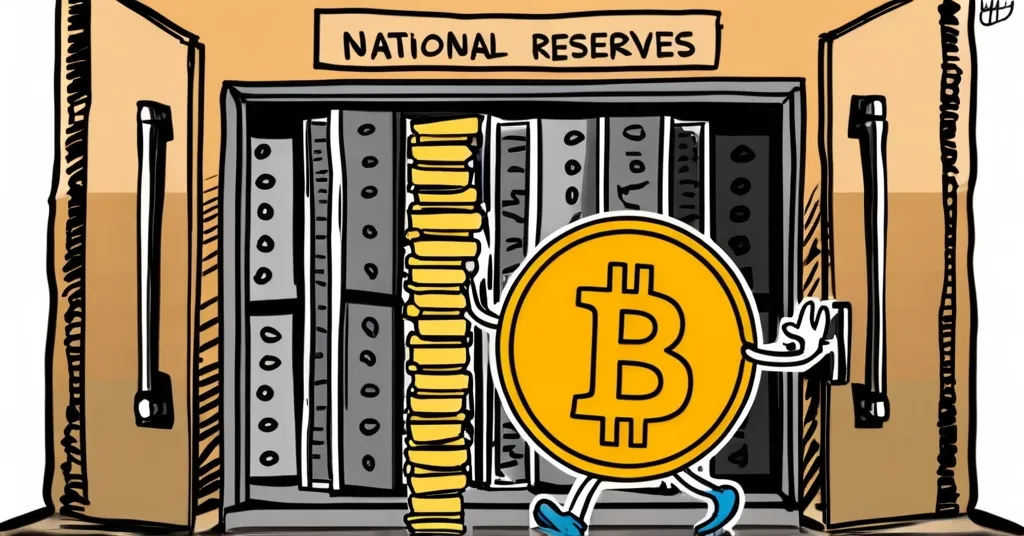Czech Republic Proposes $7.3B Bitcoin Investment Amid Global Trend

Czech Republic Considers $7.3B Bitcoin Investment as Global Adoption Rises
The Czech Republic’s central bank is weighing a significant move by proposing to allocate $7.3 billion, or 5% of its reserves, into Bitcoin. This proposal, if greenlit, would mark one of the largest state-level Bitcoin investments and reflects a growing trend of governmental interest in Bitcoin as a strategic reserve asset.
– Czech Republic eyes $7.3B Bitcoin investment
– Global trend toward government Bitcoin holdings intensifies
– Bitcoin’s legitimacy as a reserve asset grows
The Czech National Bank’s (CNB) contemplation of investing over 71,000 BTC into its reserves is not just about riding the crypto wave; it’s a calculated strategy reflecting a shift where Bitcoin is increasingly seen as a legitimate reserve asset. This move, proposed by CNB Governor Aleš Michl, aims to explore Bitcoin’s feasibility as part of the bank’s reserves, adding to its gold and stock holdings. The decision is still under review, but it signals a potential turning point in how nations view cryptocurrency. For more details on the central bank’s proposal, visit this source.
Changpeng Zhao, the visionary behind Binance, has long predicted this shift. “Governments would move from passive observation to actively considering Bitcoin as a reserve asset,” he stated at the Bitcoin MENA conference, echoing his belief that smaller countries might lead the way, with larger ones like China potentially following suit. His foresight seems to be coming to fruition, with countries like Switzerland debating integrating Bitcoin into its national constitution, and Hong Kong cautiously expanding its crypto regulatory framework, albeit with no direct mention of using the Exchange Fund for Bitcoin holdings. Read more about Zhao’s prediction here.
Chile, on the other hand, has been rumored to form a congressional committee to assess Bitcoin’s role in national reserves, though this could not be verified. These global discussions underscore a broader trend where Bitcoin is gaining legitimacy not just as a speculative asset but as a strategic tool amid economic uncertainties. For more on Bitcoin policy developments in Switzerland, Hong Kong, and Chile, check out this report.
As of January 2025, the U.S., China, and the U.K. lead in Bitcoin holdings, though these have been primarily from law enforcement seizures rather than direct investments. The U.S. boasts approximately 207,189 BTC, valued at $21.48 billion, stemming from cases like Silk Road and Bitfinex. China holds 194,000 BTC ($20.11 billion) from the PlusToken Ponzi scheme, and the U.K. has 61,000 BTC ($6.32 billion) from cybercrime operations. These figures highlight the existing Bitcoin landscape, where nations are already holding significant amounts, albeit through different pathways. For a general overview of government Bitcoin holdings, visit this Reddit discussion.
The economic rationale behind central banks considering Bitcoin reserves is multifaceted. It’s about hedging against inflation and diversifying asset portfolios in the face of global economic uncertainties. Bitcoin, as a ‘hard’ asset, offers a counterbalance to traditional financial systems grappling with instability. Yet, this move isn’t without its pitfalls. The crypto space is notorious for scams, and Bitcoin’s volatility can be a double-edged sword. As we champion Bitcoin and the broader crypto revolution, we must keep a critical eye on these risks. Learn more about Bitcoin as a reserve asset on Quora.
Lucien Bourdon, a Bitcoin analyst at Trezor, shared his insights on this development, “The Czech Republic’s decision could mark a turning point for global Bitcoin adoption. It’s about empowering individuals and states to strengthen sovereignty against monetary debasement and external economic pressures.” This perspective highlights the political and philosophical dimensions of Bitcoin reserves, suggesting a potential shift in global financial power dynamics. For more on Bitcoin investment strategies by central banks, visit this analysis.
But what about the future? Is Bitcoin just a fleeting trend, or is it the cornerstone of a new financial era? The answers to these questions are unfolding before our eyes, with each nation’s move adding a new piece to the puzzle. If countries like the Czech Republic dive into Bitcoin reserves, it could pave the way for further institutional and national-level investments, reshaping global monetary policy and financial stability. To understand more about the global adoption of Bitcoin by governments, read this educational piece.
So, as we navigate this exciting yet turbulent landscape, let’s keep our eyes open, our minds sharp, and our wallets secure. The future of money is here, and it’s up to us to shape it.
- What is the proposed Bitcoin investment by the Czech Republic?
The Czech Republic’s central bank is proposing to invest $7.3 billion, which is 5% of its reserves, into Bitcoin.
- Who predicted an increase in government interest in Bitcoin as a reserve asset?
Changpeng Zhao predicted that governments would move from passive observation to actively considering Bitcoin as a reserve asset.
- Which countries are exploring similar initiatives to the Czech Republic?
Switzerland, Hong Kong, and Chile are exploring similar initiatives regarding Bitcoin investments and policies.
- How did the U.S. acquire most of its Bitcoin holdings?
The U.S. acquired most of its Bitcoin holdings through law enforcement seizures related to cases such as Silk Road and Bitfinex.
- What does the increasing governmental interest in Bitcoin suggest about its role?
The increasing governmental interest suggests that Bitcoin’s role as a sovereign asset is expanding, potentially setting the stage for further institutional and national-level investments.



